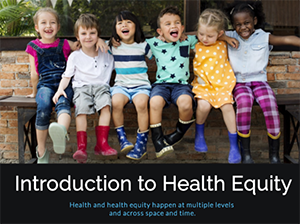 Welcome to this series on Health Equity.
Welcome to this series on Health Equity.
The following modules introducing health equity are geared for people already working in public health, as well as students seeking a master of public health degree.
The first module begins with an introduction to health equity. It discusses how health is more than just sickness or its absence, and that health inequities are more than just differences in health outcomes. The second module explores the relationship between health and power, considering what it means to suggest that “the root cause of health inequity is powerlessness.” The third module discusses ideas for operationalizing health equity in practice, and specifically looks at opportunities to expand the definition of health, strategically use data, assess and influence the policy context, and strengthen community capacity to act on health inequities.
Reflection points are included throughout the modules to encourage you to consider how you might integrate concepts and resources into your own work.
Learning Objectives:
Upon completing these modules, you will be able to:
- Use a broad definition of health that includes social determinants
- Reflect on how conditions of power shape social determinants and health inequities
- Identify opportunities to operationalize strategies to advance health equity in your own work or practice.
Click on the link to access each interactive segment:
- Health Equity | Introduction (approx. 10 mins) Transcript
- Health Equity | Health & Power (approx. 10 mins) Transcript
- Health Equity | Operationalize Health Equity (approx. 20 mins) Transcript
These modules are presented by Paula Tran Inzeo from Mobilizing Action Toward Community Health (MATCH) at the University of Wisconsin Population Health Institute.
References & Resources
Resources and references that are mentioned throughout the modules are included below. Additional resources that accompany these modules and allow you to further explore health equity practice can be found on the Mobilizing Action Toward Community Health [MATCH] website.
Defining Health Equity
- County Health Rankings Model
- What Is Health Equity? And What Difference Does a Definition Make?
- Visualizing Health Equity: One Size Does Not Fit All Infographic
- The problem with that equity vs equality graphic you’re using
- National Association of Counties Social Determinants of Health
- About Adverse Childhood Experiences
- A Framework for Public Health Action: The Health Impact Pyramid
- What is Community Engagement
Operationalizing Health Equity
- HealthEquityGuide.org
- The Foundational Practices for Health Equity A Learning and Ction Tool for Public Health Organizations
- Health in All Policies A Guide for State and Local Governments
- HEDA: Conducting a Health Equity Data Analysis
- Ramsey County 2017 Health Equity Data Analysis Final Report
- Healthier Lives, Stronger Families, Safer Communities
- Multnomah County Healthy Homes Policy Toolkit
Citations and Suggested Reading
Adams, R. (2008). Empowerment, participation and social work. New York: Palgrave Macmillan; p.xvi.
Braveman, P. A., Kumanyika, S., Fielding, J., LaVeist, T., Borrell, L. N., Manderscheid, R., & Troutman, A. (2011). Health disparities and health equity: the issue is justice. American Journal of Public Health, 101(S1), S149-S155. https://www.ncbi.nlm.nih.gov/pmc/articles/PMC3222512/
Brennan Ramirez LK, Baker EA, Metzler M. (2008). Promoting Health Equity: A Resource to Help Communities Address Social Determinants of Health. Atlanta: U.S. Department of Health and Human Services, Centers for Disease Control and Prevention.
Expanding the Boundaries: Health Equity and Public Health Practice, National Association of County & City Officials, May 2014
Exploring the Roots of Health Inequity: Essays for Reflection, National Association of County & City Officials, May 2014
Center for Disease Control and Prevention (CDC). (2011). Principles of community engagement. Second Edition. https://www.atsdr.cdc.gov/communityengagement/pdf/PCE_Report_508_FINAL.pdf
Christens, B.D. (2013). In search of powerful empowerment. Health Education Research, 28(3).
Christens, B. D., & Speer, P. W. (2015). Community organizing: Practice, research, and policy implications. Social Issues and Policy Review, 9(1), 193-222.
Healy, R. & Hinson, S. (2016). The Four Faces of Power. The Grassroots Policy Project.
Human Impact Partners and WISDOM. November 2012. Healthier Lives, Stronger Families, Safer Communities: How Increasing Funding for Alternatives to Prison Will Save Lives and Money in Wisconsin.
IOM. (2015). Chapter 4: The Role and Potential of Communities in Population Health Improvement. Organizing Around the Social Determinants of Health. https://www.nap.edu/read/18946/chapter/5.
Iton, A., & Shrimali, B. P. (2016). Power, politics, and health: a new public health practice targeting the root causes of health equity. Maternal and child health journal, 20(8), 1753-1758.
Lukes, S. (1986). Power: A Radical View. NYU Press.
Milstein, B. (2003). Exploring interfaces between public health and democracy. Milstein B. Humphrey Institute for Public Affairs and the Jane Addams School for Democracy; Minneapolis, MN.
Mondros, J. B., & Wilson, S. M. (1994). Organizing for power and empowerment. Columbia University Press. Community Psychology; p. 43–63.
Nelson, J., Spokane, L., Ross, L., & Deng, N. (2015). Advancing Racial Equity and Transforming Government: A Resource Guide to Put Ideas into Action. Local and Regional Government Alliance on Race & Equity.
Nelson, J. & Brooks, L. (2016). Racial Equity Toolkit: An Opportunity to Operationalize Equity. Local and Regional Government Alliance on Race & Equity.
Schrantz, D. M. (2012). Drawing on community organizing to advance public health in Minnesota and beyond. Health Affairs, 31(12), 2799-2800.
Solar O, I.A. (2010). A conceptual framework for action on the social determinants of health. Social Determinants of Health Discussion Paper 2 (Policy and Practice).
Speer, P. W., Tesdahl, E. A., & Ayers, J. F. (2014). Community organizing practices in a globalizing era: Building power for health equity at the community level. Journal of health psychology, 19(1), 159-169.
Wellstone. The Organizers Guide to the Galaxy: Strategic Planning.
Zimmerman, M.A. (2000). Empowerment Theory: Psychological, Organizational and Community Levels of Analysis. Handbook of Community Psychology; p. 43–63.
